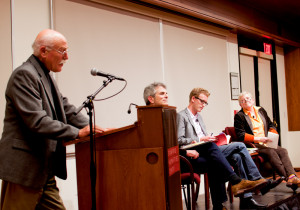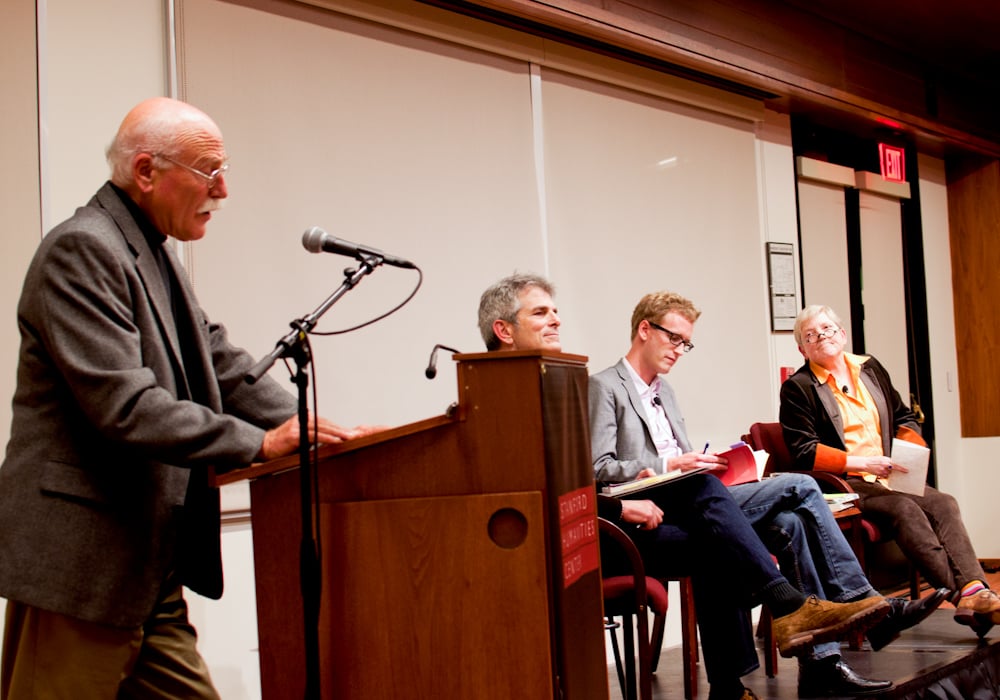Formed last year, the Another Look book club is already drawing members from outside the Stanford community with its discussion of obscure works of literature.
Directed by English professor Tobias Wolff M.A. ’78, the club seeks to recreate the excitement of reading that many feel at a young age for works that are less recognized.

“There’s so much great work out there that inevitably, some of it falls under a kind of shadow of obscurity even though it should be in the light,” Wolff said. “Part of our mission is to bring these kinds of works into light again. Put people’s attention on them and encourage conversation about them.”
Another Look has been a fulfilling experience for Cynthia Haven, a visiting scholar at the Division of Literatures, Cultures and Languages, who said the mailing list for Another Look has grown to more than 600 people in the past year.
“When we started Another Look, I knew the idea of finding short, overlooked books would be a powerful one,” Haven said. “What I didn’t expect is how much I would personally gain from the series.”
“I have had a chance to explore short masterpieces that I may not have read on my own and I have also had a chance to discuss them with cutting-edge writers and scholars,” she added.
One of the writers who has served as a panelist is Vendela Vida, a Bay Area novelist, journalist and editor.
In the past year, the club has put on four events, one per quarter. The works discussed so far have been “So Long, See You Tomorrow” by William Maxwell, “The Wife of Martin Guerre” by Janet Lewis, “Gentlemen Prefer Blondes” by Anita Loos and “My Father and Myself,” a memoir by J.R. Ackerley.
This coming winter, Wolff will be leading a discussion on “The Ghost Writer” by Philip Roth.
The club’s discussion incorporates both panelist’s opinions and audience participation.
“It’s like a good dinner-table conversation among really smart people who have all read the same book,” Wolff said. “Then they open it up to the audience who can then pitch in and join the conversation.”
Another Look has been drawing participants from outside the Stanford community including Bryndie Beach, landscape planner and architect in Carmel, Calif., and mother of a Stanford student, who makes the drive to Stanford for the book club’s quarterly meetings.
“It’s worth it to me to make that drive up to the book forum,” Beach said. “I think that one of the things that intrigued me the most was this idea that Tobias Wolff talked about when the group first started: there were all of these wonderful pieces of literature that are just overlooked or forgotten.”
Another Look is open to the entire Stanford community, including undergraduates and graduate students.
“Part of that community certainly includes Stanford students, who offer a new generation of perspectives to these overlooked classics,” Wolff said. “We publicize the event heavily on campus, and hope to reach out in more ways in the future to ensure a strong student presence at events.”
Elena Danielson M.A.’70 Ph.D. ’75, former director of the Hoover Archives, said she first read about the Another Look book club on Haven’s blog.
“These were real Stanford faculty sitting in front of real people in an audience that would respond to your comments and answer your questions,” she said.
The club has proven to be a learning experience for Danielson.
“[“So Long, See You Tomorrow”] was so enjoyable and Maxwell had a great writing style, but I had missed the whole point,” she said. “One of the characters was totally imaginary. If I hadn’t gone to the book club, I would have never learned that.”
Now, Danielson has pioneered the discussion of “So Long, See You Tomorrow” with her personal book club.
“This friend said that she loved the book and without my explanation, she wouldn’t have gotten that the character was imaginary either,” she said. “My explanation came from the Stanford faculty, from people like Toby Wolff, who brought out the meaning for me.”
Contact Angelique Dakkak at angeldak ‘at’ stanford.edu.
